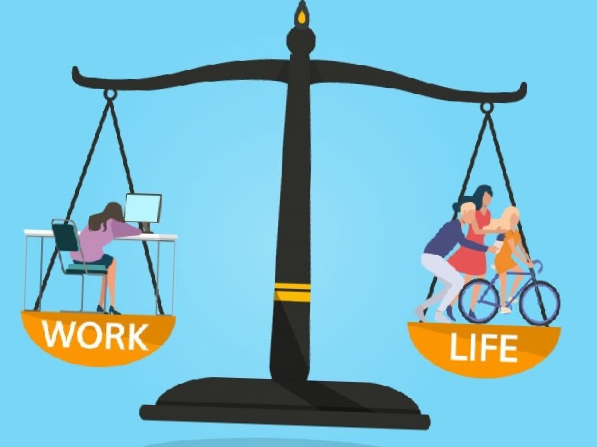- HOME
- About Us
- Mandatory Disclosures
- COURSES
- Campus Life
- Gallery
- Blogs
- Events
- Contact
“Work-life” – The Perfect Balance

Work-life balance refers to the equilibrium between professional responsibilities and personal activities outside of work. It involves managing one’s time and energy effectively to ensure the fulfilment in both areas without one overshadowing the other. Achieving a healthy work-life balance promotes well-being, reduces stress, and enhances overall quality of life. People are usually either at work or at home. Any individual usually spends a major part of the day’s productive time at work and this is an important face of life. One’s productivity depends, not only on factors related to one’s work, but also on various others factors related to individual’s personal life.
Importance of work-life balance:-
Work-life balance is important for a whole range of reasons, both personal and professional.
It is crucial for several reasons:
- Physical and mental well- being: Overworking can lead to burnout, stress, and physical health issues like high blood pressure and heart disease. Conversely, neglecting one’s career can lead to financial strain and dissatisfaction. Striking a balance ensures individuals can prioritize both their physical, mental and psychological health.

- Enhanced productivity: A well balanced life fosters increased productivity when individual have time to relax and rejuvenate outside of work, they return to work more focused, and motivated leading to higher efficiency and better performance.
- Improved relationship: Neglecting personal relationships due to work commitments can strain relationships with family and friends. Maintaining a balance allows individuals to spend quality time with loved ones, fostering stronger connections and overall happiness.
- Societal impact: A workforce that prioritizes work-life balance contributes to a healthier society overall. It can be lead to reduced healthcare costs, lower rates of stress related illnesses, and a more engaged and productive workforce, ultimately benefiting communities and economies.
- Personal growth: Pursuing hobbies, interest and activities outside of work fosters personal growth and development. It allows individuals to explore new skills, passions and experiences, leading to a more fulfilling life overall.
How to maintain the healthy work-life balance:
- Set clear boundaries between work and personal life.
- Prioritize tasks and manage time effectively.
- Take regular breaks and schedule time for relaxation.
- Communicate openly with your boss about your needs.
- Disconnect from work- related technology during personal time.
- Invest in self- care activities and prioritize your health.
- Set realistic expectations and learn to say no when necessary.
- Seek support from friends, family and Colleagues.
- Remember that achieving balance is ongoing process, not a one-time task.
- Regularly assess and adjust your work – life balance strategies.
- The unique nature of our lives and fluctuating responsibilities means that work-life balance and integration look different for everyone. Some examples include:
- A stay- at -home working parent who tackles assignments while their newborn is napping.
- A student who forgoes a Friday night party to study for exams.
- A lawyer who dedicates extra time to assignments during some periods of the year but who consciously unplugs during others when on holiday.
- An immigrant who uses their work breaks to study for their citizenship test.
- A janitor who crafts their schedule to work specific days so that, on other days, they can take care of their elderly parents.
Conclusion:
In conclusion, achieving and maintaining work- life balance is essential for overall well-being, productivity and fulfilment. It involves setting boundaries prioritizing tasks and taking care of oneself physically, mentally and emotionally. By effectively managing time, communicating needs with employers and nurturing personal relationships, individual can create a harmonious integration of work and personal life. Striking this balance requires ongoing effort and adaptation, as circumstances and priorities may change over time. However, by prioritizing self-care, setting realistic expectations and seeking support when needed, individuals can lead happier and healthier and more satisfying lives both at work and at home.
Ultimately, work-life balance is not just about dividing time between work and personal pursuits but about finding harmony and fulfilment in all aspects of life.

